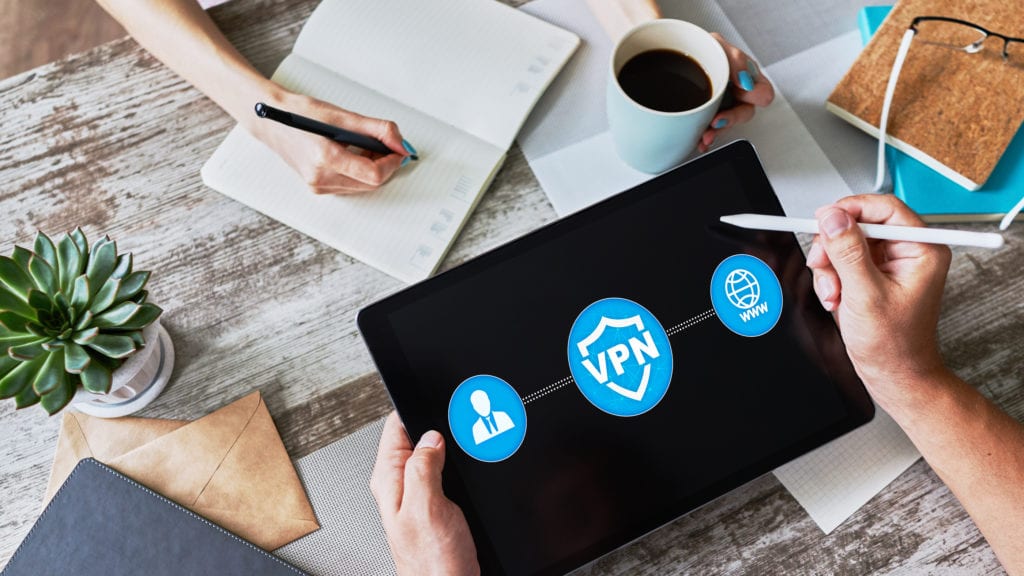
One of the cybersecurity protections that you may have heard more about during the pandemic is a virtual private network (VPN). The shift to remote workers has many companies looking for ways to keep their data connections secure, and a VPN is one way to do this.
VPNs are used both for personal and business use for a variety of reasons, one of these is cybersecurity, helping to prevent unauthorized PC access. But that’s not the only reason that using a VPN has become popular.
Approximately 26% of all internet users have used a VPN service.
To understand why you might need a VPN, let’s discuss what “virtual private network” means and what one can do.
Virtual Private Network Basics
A VPN is a service that’s provided by a company to secure online connections. The VPN service has a number of servers through which it can route your internet connection.
So, instead of your computer directly connecting to a website you’re visiting in your browser, your connection will route from your PC to the VPN server and then to the internet.
What this does is allow the VPN service to do the following:
- Add security to your data traffic via encryption
- Display a different IP address to a website (the server’s instead of yours)
- Apply additional protection, such as DNS filtering
- Speed up your connection (in some cases)
A VPN service will typically give a user several options for routing their connection. For example, they may have one server in New York, one in Atlanta, and another in London. Users will choose which server they want to use for any given internet session based upon proximity to them (for speed) or the country the VPN is in (to get around censorship or country-specific entertainment barriers).
The VPN is used through an app on a computer or mobile device. Once it’s downloaded and you are logged in, you’ll choose the server to connect through. The service generally will stay “on” and route all your internet connections unless you turn it off.
Many also have what’s known as a “kill switch,” which disables your internet connection altogether if the connection to the VPN suddenly drops.
Reasons to Use a VPN
Security
One of the top reasons that VPNs are used and the reason they’ve grown in popularity during the pandemic is the security they offer.
Not all home routers will have good security and may easily be hacked. If you use free Wi-Fi at a coffee shop or anywhere else that can also mean a security risk from a “man in the middle” attack. This is where a hacker connects to the same Wi-Fi signal as you and is able to spy on your activity.
VPNs encrypt internet connections, making your data traffic safe whether you’re logging into online banking or transferring a file. They can secure a session even if you’re on a public, unsecure wireless hotspot. This can help protect you from identity theft.
Privacy
Wherever you go on the internet, websites are identifying you by your IP address. IP addresses give a general vicinity of where you are physically located (typically a city, state, country).
When interacting with others online, you may not always want them to know your location. Likewise, you may wish to have more privacy when visiting sites, instead of having advertisers track your every move.
When you connect through a VPN, it masks your IP address by displaying the one for its server instead. So, any sites that you visit won’t see your personal IP address, and instead will see the one for the VPN server, which could be several states or a country away from your actual location.
More Entertainment
A survey of VPN users found that 51% of them connect with a VPN to gain access to more entertainment content. They may want to watch a show that is only available online in a certain country or have the ability to watch a particular sporting event.
Services like Netflix will serve different content based upon location and having the ability to connect with a VPN in multiple countries can allow you to see entertainment not available where you live.
Access Blocked Content
In certain countries content may be blocked, such as certain websites or social media sites. In these cases, connecting to a VPN can allow the user to get past a block and access a site by using the IP address of the VPN server instead of their own.
Faster Connection
Not all VPNs will offer a faster internet connection, but some do advertise this feature.
Depending upon your internet providers, a VPN may resolve a DNS address faster. This is when the IP address of the website is matched to the domain name (www.name.com) of the site you’re visiting. If the match between domain and IP address is faster, you get to a website faster.
Some VPNs may also help you avoid any throttling by an ISP.
Get Help with Strong Wi-Fi & a Secure Connection
Two River Computer can help you stay safe online as well as optimize your home or business Wi-Fi for speed and reliability.
Contact us today to learn more. Call 732-747-0020 or reach us online.


